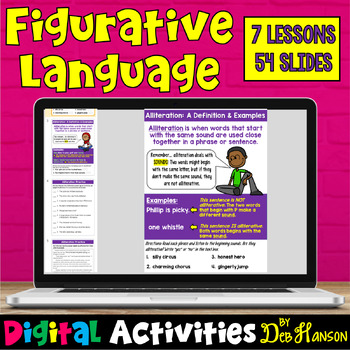I always look forward to lessons that include a fun read-aloud. This alliteration lesson is among my favorites because it includes an entertaining book by one of my favorite picture book authors, Margie Palatini. I became a huge fan of Margie Palatini more than twenty years ago when I read Piggie Pie to my first group of second graders, and I have enjoyed every book that she has written since. When I pick up one of her books, I know I will laugh out loud!
Margie Palatini has two books that contain lots of alliteration, so I always use at least one of these when I introduce this topic. (Amazon affiliate links follow.) One of the books is called Moosetache and the other is pictured below.
Tips About Teaching Alliteration
Alliteration seems like a pretty simple concept, right? That was my assumption before I taught this skill for the first time. For the most part, students do seem to learn it quickly. However, I have noticed three areas that sometimes confuse students. Below, I have listed three rules that I emphasize when teaching alliteration.#1- Two words is enough to make a phrase alliterative.
Yes, Leah licked a luscious lemon lollipop is alliterative. But A caravan of camels was seen in the distance is also alliterative.
#2- The words have to be near each other.
Steph drove to Walmart to buy a new stereo is not alliterative. There are too many words between Steph and stereo to make that sentence alliterative.
#3- The beginning sounds are the same, not the beginning letters.
Unfortunately, the photograph was fuzzy is alliterative, but They found a green gem is not alliterative.
Click on the image below to download this FREE practice worksheet.
Thanks for stopping by!
~Deb
If you are looking for additional figurative language lessons, feel free to check out these digital lessons. They include both teaching slides and practice slides. Lessons focus on similes, metaphors, alliteration, onomatopoeias, personification, hyperboles, and idioms.











I love teaching alliteration because the kids have so much fun after they get the idea.
ReplyDeleteGreat anchor chart as always!
Thanks for hosting the linky!
- Lucy
Can't wait to use this with my grandson. Thanks so much for sharing.
ReplyDeleteArlene
LMN Tree
I also love to teach alliteration. My students often choose it for writing time when they finish other projects.
ReplyDeleteArtistry of Education